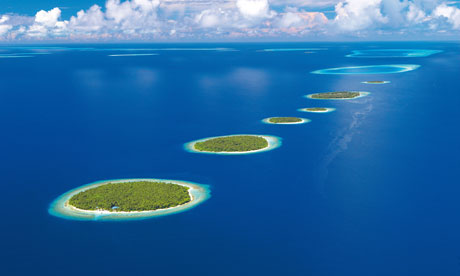Like the azure ocean waters, the challenge of global warming is clear in the archipelago. But can the Intergovernmental Panel on Climate Change's new report crystallise action?
 |
Paradox in paradise: the Maldives economy runs on the natural beauty that development, climate change and other environmental problems threaten. Photograph: Sakis Papadopoulos
|
Like rays of burning sunlight concentrated through a magnifying glass, almost all the world's environmental problems come into sharp focus in the Maldives. The 1,000km-long archipelago is the extreme test case.
The lowest lying country in the world is not even built on sand, but on the planet's most endangered ecosystem, coral reefs, the smashed fragments of which comprise every stunning white beach. And not only is the tide of sea level lapping at the shallow islands, but sea temperatures are rising as is the acidity of the ocean: both kill the corals.
The news from the world's climate scientists in their landmark report on Friday will be that the threat of global warming is worse and more imminent than in their 2007 analysis. But what is being done?
The beating sunlight in the Maldives should at least deliver plentiful solar power. But in a grim irony, the 400,000 islanders, whose overall contribution to planet-warming carbon emissions is negligible, are entirely hooked on diesel for the generators that keep their lights on. The nation, which is close to broke, spends over a quarter of its GDP on the fuel and pays colossal subsidies to keep energy bills affordable.
Solar power would be a just quarter of the cost on most islands, Mohamed Arjwad at the Maldives energy authority told me, making it a no-brainer - in theory. But there's no capital or expertise to deliver it, he says.
Instead international investors are piling into tourism, the mainstay of the economy. Despite the doubts about whether the Maldives will keep its head above water and the $1.5m per room cost of developing luxury resorts, the existing 110 resort islands are set to be joined by 50-60 more, each posing dangers to the fragile coral environment.
"That is too many if they are not implemented well, and they are not," says Armando Kraenzlin, regional vice-president for the Four Seasons resorts in the Maldives, which spends hundreds of thousands of dollars a year on marine scientists in an attempt to protect its own natural coral and sealife assets.
Stark contradictions also exist in the Maldives' second biggest industry, fishing. Traditional pole-and-line caught tuna is as sustainable as tuna fishing can be, yet the groupers and snappers which form a cornerstone of the coral ecosystem which underpin the islands are being fished out. Sea cucumbers, fat as marrows, are going the same way and the use of the lagoon-nurseries where sharks and rays breed their young for sea cucumber farms is growing, along with the risks of pollution.
"The Chinese pay a hell of a lot of money for these: that is good for us and also bad for us," Dr Shiham Adam, head of the Marine Research Centre, tells me. The tension is summed up by anecdotes of the increasingly numerous and rich Chinese tourists who are attracted by the extraordinary sea life and then eat it.
Add to all these challenges the vast and growing rubbish mountains - the only hills in the Maldives, locals joke – and the growing freshwater crisis and it's clear the Maldives is on the environmental front line.
Many of these problems could be solved. Many of the solutions, like solar power, are cheaper in the Maldives than the status quo, but incur an upfront cost. The inevitable tension between raising incomes in a relatively poor nation and over-exploiting the natural source of the wealth is creating a paradox in paradise.
But perhaps the biggest challenge of all is apathy. For most Maldivians, the problems are out of sight and out of mind. Travel in the vast archipelago is expensive and most Maldivians will see only two or three of the 1,200 islands. Many, especially women, cannot swim and so do not see the riches below the sea's turquoise surface, such as the orange and white clownfish snuggling into the waving mauve and green-tipped tentacles of their anemone homes.
Mohamed Aslam, a former environment minister, accepts the short term nature of politics and the focus of voters in the current presidential campaign on housing, health and welfare benefits. "There is a mismatch in timescale. Climate change is decade-long or more but political timescales are four to five years," he says. "But you need to survive to enjoy those benefits. Just because you are not dead now doesn't mean you are not dying."
With the new report from the Intergovernmental Panel on Climate Change (IPCC) on Friday, the threat to the Maldives will be clearer than ever. The solutions are also clear, both globally and locally, and the investments required are perfectly sound.
But if the extreme case of the Maldives is not being dealt with, and it is not, can the will and the ways really be found to tackle the global problem? The IPCC report will sound the alarm louder than ever, but will it be heard?
Mohamed Nasheed, whose advocacy as president put the Maldives on the climate change map, is uncertain. Asked for the odds of his grandchildren inheriting an inhabitable Maldives, he says: "50-50."
Source: theguardian.com
No comments:
Post a Comment
Note: Only a member of this blog may post a comment.